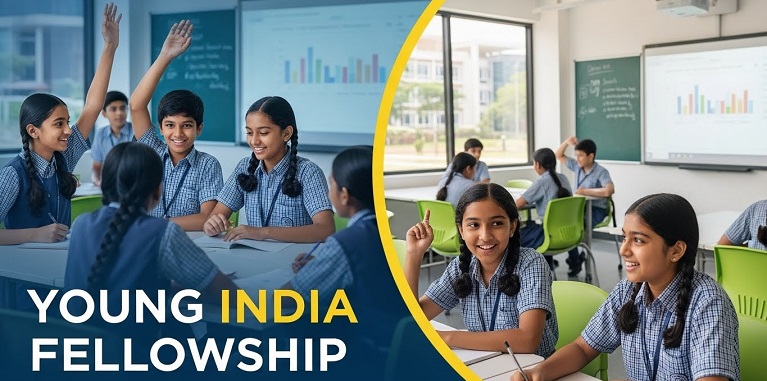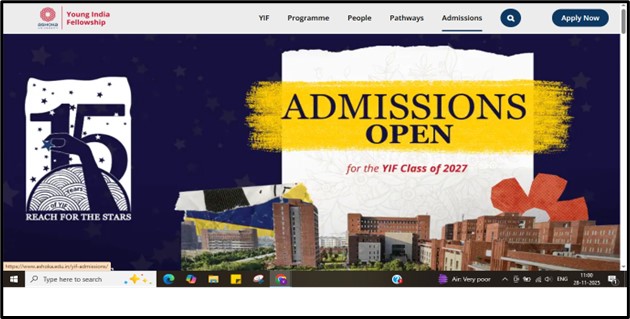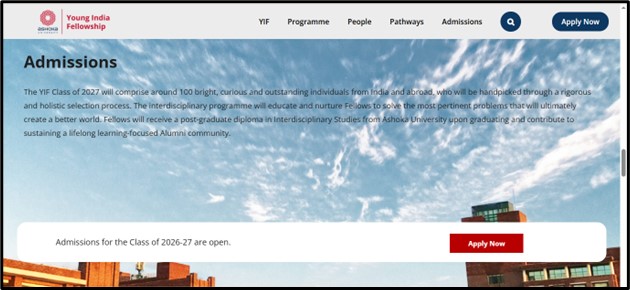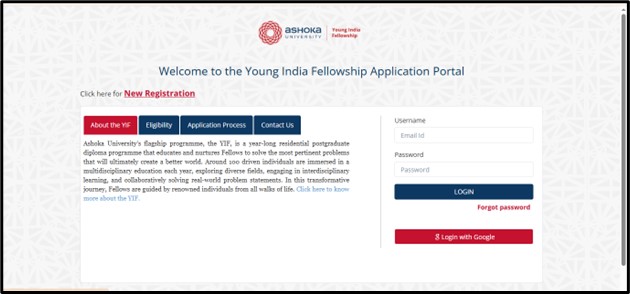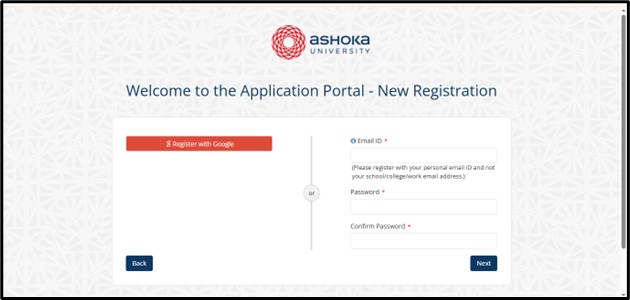Specifically designed for meritorious graduates who seek intellectual depth, leadership growth, and multidisciplinary learning, each year, YIF brings together a diverse cohort of talented individuals, selected through a rigorous process to shape future thinkers, innovators, and changemakers.
Young India Fellowship – Important Dates
All applications for the Young India Fellowship must be submitted before the Round 1 deadline. Students who submit their applications before the priority deadline receive added advantages, such as earlier application have higher chances of securing interview slots.
Young India Fellowship – Admission Timeline
| Event | Timeline |
|---|---|
| Priority Deadline | December 8, 2025 |
| Personal Interviews | December 2025 – February 2026 |
| Round 1 Deadline | January 19, 2026 |
| Offers for Admissions | March 2026 |
Young India Fellowship – Eligibility Criteria
Here’s a detailed list of the eligibility criteria for the Young India Fellowship. Interested fellows must adhere to the pointers mentioned below, for only then will they be considered eligible for this program. Take a look –
- There is no age limit for applying for this fellowship
- Candidates from all backgrounds and nationalities are eligible to apply
- Applicants should have completed a recognised undergraduate degree or equivalent in any discipline
- Final-year undergraduate students who will complete their degree or equivalent by the summer of 2026 are also eligible to apply
- Students having a valid work experience (full-time, entrepreneurial, freelance, or internship experience) will be given preference over others
Young India Fellowship – Benefits
As per the specifications of the Young India Fellowship program, 100 fellows will receive a post-graduate diploma from the Ashoka University. Moreover, each fellow will receive partial (25%) or full financial (100%) support that will cover tuition fees, residential fees, and meals.
In addition, a few exceptional students will be given a chance to receive the Chancellor’s Scholarship which covers 100% tuition and residence fee.
Young India Fellowship: Need-Based Scholarship
Although every fellow who will be selected for the YIF program will receive a minimum scholarship in the form of 25% fee waiver. Students with poor financial conditions can also apply for a need-based scholarship that will cover the entire tuition and residence fees, along with the meals.
This need-based scholarship will help you save the following expenses –
- ₹7.98 lakh of tuition fees
- ₹2.05 lakh of residence fees
- ₹70K of food expenses (this amount is indicative and subject to change)
Important note – The need-based scholarship application opens on the same day that admissions decisions are announced (probably March 2026) and remains open for one week.
People also read: Haryana Scholarships 2025 – List of Schemes & How to Apply?
Young India Fellowship – Documents Required
Applicants are required to submit the following documents while applying for the YIF program –
- Government-issued ID
- A photograph
- A one-page CV/resume
- Previous year marksheets, and supporting documents for non-academic activities
- Three written essays and one video essay
- One Letter of Recommendation (LoR)
- Income Tax Returns for FY 2022-23, 2023-24 and 2024-25 (last 3 years)
- Bank Account Statements (for the last 12 months)
- Salary Statements (for the last 3 months)
- Loan Statements (if a loan expense is shown)
- Details of the family’s financial assets, such as investments, real estate, vehicles, etc.
- Details of any loans, mortgages, etc.
Also read: MBA Scholarships in India 2025 – List of Scholarships, Eligibility, Awards
Young India Fellowship – Application Process
Here’s a step-by-step guide for applying for the Young India Fellowship program. Take a look –
Step 1 – Visit the official website of Ashoka University.
Step 2 – Scroll down to Admissions and click on ‘Apply Now’.
Step 3 – Click on ‘New Registration’.
Step 4 – Register with a valid email address and verify it through the link sent to your inbox.
Step 5 – After verifying, you can start filling out the application form.
Young India Fellowship – Selection Process
The committee at Ashoka University handpicks every fellow via a rigorous selection process, ensuring that only the most dedicated, talented, and passionate individuals are chosen. Take a look at the selection process below –
Online application
This is the initial stage of the selection process where the candidates are required to submit their applications online. The essays and the supporting documents submitted by the candidates are reviewed by experts, and the shortlisted candidates are invited for the personal interview.
Personal interviews
All shortlisted candidates must attend this virtual personal interview that is conducted by the two of the most experienced panelists of Ashoka University. Based on the evaluation done by the panelists, a few candidates will be shortlisted for the opportunity to receive the Chancellor’s scholarship.
Final Selection
Applicants would typically receive one of the three decisions: an offer of admission to YIF program (with or without the Chancellor’s Scholarship), waitlisted for admission, or a denial of admission. Admitted and waitlisted candidates will have the opportunity to apply for the need-based scholarship.
Also read: Medical Scholarships 2025-26 – Eligibility, List & Guide
Frequently Asked Questions
What is the Young India Fellowship (YIF)?
The Young India Fellowship (YIF) is a prestigious one-year postgraduate diploma program offered by Ashoka University. It brings together exceptional graduates from various disciplines and provides them with a multidisciplinary learning experience, mentorship, and career development opportunities.
When is the last date to apply for the Young India Fellowship?
The last date to apply for the Young India Fellowship program is January 19, 2026. A priority deadline is December 8, 2025, and applications submitted before this date will be processed sooner.
How can students apply for the Young India Fellowship?
Applications must be submitted online through the official Ashoka University admissions portal. Candidates must fill the form, upload documents, submit essays, and complete the interview stages.
Who is eligible to apply for the Young India Fellowship?
Applicants must hold a recognized undergraduate degree in any discipline and demonstrate strong academic performance, leadership qualities, critical thinking, and a commitment to learning. There is no age limit, and candidates from all professional and academic backgrounds can apply.
Is financial aid available for YIF fellows?
Yes. Ashoka University offers need-based financial aid which may cover tuition fees, residence charges, and other program costs based on the applicant’s verified financial condition.
Do applicants need prior work experience?
No specific work experience is required. Fresh graduates with strong academic achievements and leadership potential can apply, though applicants with 1–5 years of professional experience may have an added advantage.
